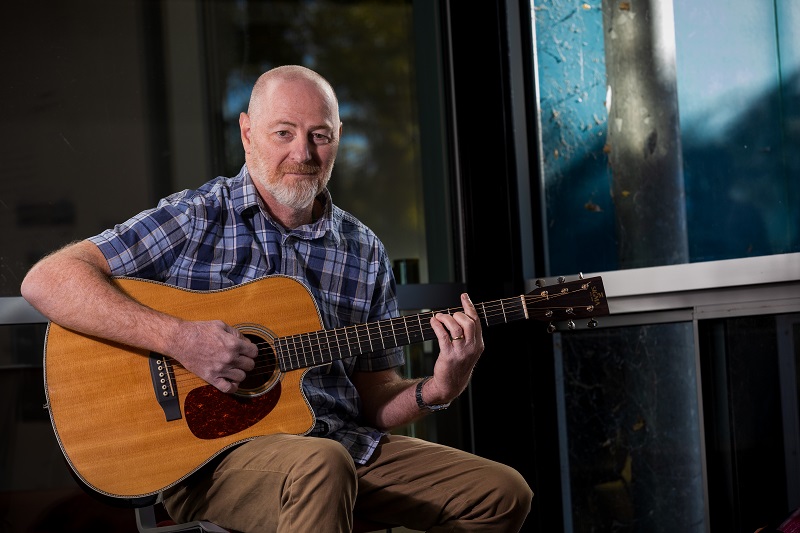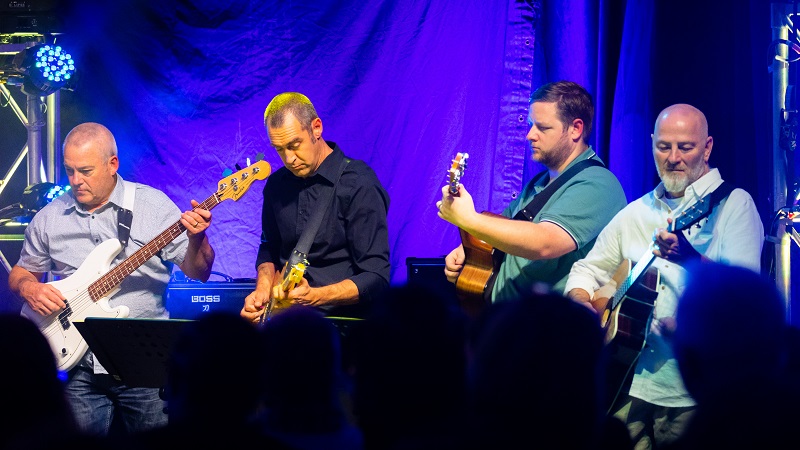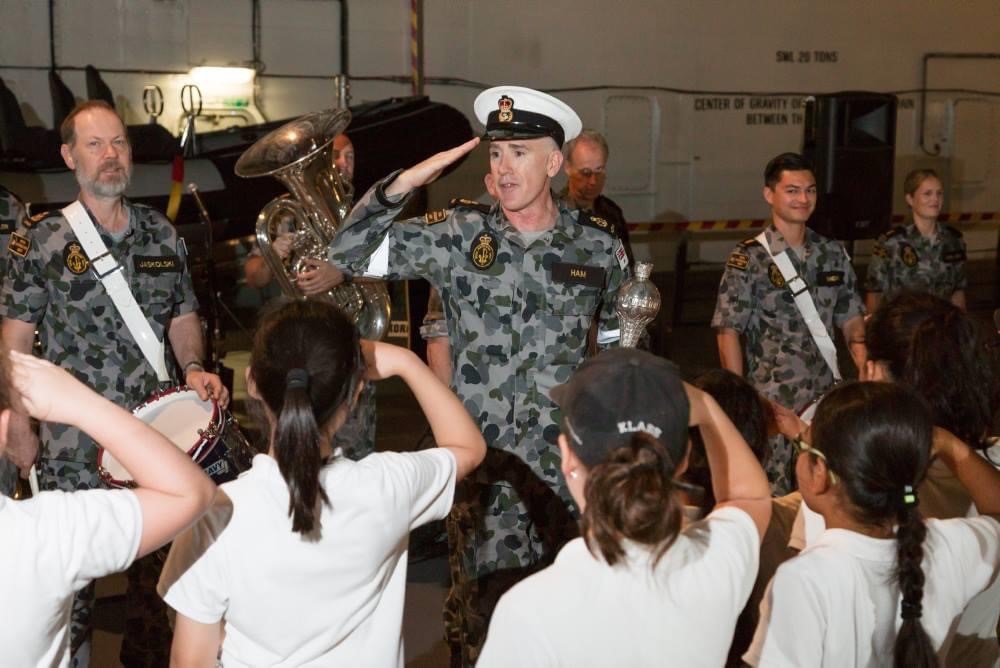Artistic licence
It’s a familiar story: when Mark Ham was medically discharged after 25 years in the Navy he felt, so to speak, at sea.
‘My personality was associated with the service,’ he says.
Raised in Newcastle, Mark (pictured below) joined the Navy soon after quitting a maths degree. He joined the Navy band as a trombonist, then studied at the Conservatorium of Music in Sydney before leaving the Navy to become a professional musician. But work began to dry up when the Global Financial Crisis hit, so Mark re-enlisted.

The next 12 years were fruitful. Mark rose to the rank of Warrant Officer. On the way he became the senior non-commissioned officer in charge of the band, went to sea several times, and deployed to Afghanistan, Iraq and elsewhere. He enjoyed some moments of great pleasure and professional pride, including playing for orphans in Cambodia.
He also served as a mentor in the Australian Defence Force’s (ADF) Arts for Recovery, Resilience, Teamwork and Skills (ARRTS) Program. The four-week residential program is held twice a year – in May and November – at the University of Canberra. It is available to ADF personnel, and a small number of veterans who have transitioned in the previous three years. The program is for those who are experiencing service-related health and wellbeing issues. No previous experience in the arts is required and most costs are covered by the program.
The ADF ARRTS program offers three streams: music and rhythm, creative writing and visual arts. Mark mentored in the music stream for several years and found it very rewarding.
‘Some of the work that comes out of it is incredible,’ he says. ‘It often left me open-mouthed … I remember one guy who came in—the program is voluntary but this bloke really looked like he didn’t want to be there. He was being medically discharged for PTSD and he looked like he wanted to kill us. But as soon as we struck up the first chord, his whole face changed. That’s the power of music. It evokes such strong emotions.’
The purpose of the program is to build confidence and resilience in those who are in need of a reset.
‘It’s an inclusive and supportive environment without rank and uniform, so each individual can feel comfortable expressing themselves,’ says Brigadier Wayne Goodman, Head of ARRTS. ‘Exposure to new experiences and sharing stories, fears and concerns with like-minded peers assists with re-integration into families, the community and the workforce. Many participants report that one of the main outcomes they get from this program is that they have a renewed sense of purpose and self-worth.’
Mark found the ARRTS program very useful when it was his turn to transition. He left the Navy for a second time in early 2022 because of mental health issues, and joined as a participant rather than a mentor. He chose the program’s creative writing stream and has been writing ever since, even completing a novel – a thriller called Careful what you wish for. He is now looking for a publisher, though he’s keen to point out that for him it’s all about the process, not the outcome.
‘The great thing about writing is that it gives you a routine,’ he says. And in writing I’ve found something that was totally different. Something that would be a challenge but not too much of a challenge. And which provides a bit of escapism.’
‘Mark is one of the program’s success stories,’ says Professor Anthony Eaton, who is a mentor in the creative writing stream and an academic at the University of Canberra. ‘He’s kept writing … and that’s exactly the outcome we’re after. He’s used writing to put himself together, to move into new worlds.’
Anthony has been an ARRTS mentor since the program was established in 2015.
‘Mentors are practising artists,’ says Anthony, who’s a published author of children’s and young adult books. ‘So that’s a big point of difference. We’re not a therapy program. It’s a creative practice but it seems to have therapeutic outcomes … for a lot of the participants, and the interesting thing is we see benefits five, six years on. Many come in feeling fairly cynical. They have pre-conceptions about the arts and creativity that don’t match with reality. It’s a chance to put on another identity and it gives them a safe place to think of themselves and their ADF identity, or for those dealing with trauma.’
Anthony adds the participants quickly become a tight-knit group and often keep in touch afterwards, with one another and with him.
‘It’s an amazing program and has made a lot of difference to people over the years. It’s a pleasure to be involved in and is one of the best things I’ve done in my years as a writer.’


Another beneficiary of the ARRTS Program is Boyd McMahon (pictured). Like Mark, Boyd is in his mid-fifties and was medically discharged in 2022. He had served 33 years in the RAAF and now lives in Townsville with his wife (also an Air Force veteran) and two adult daughters. He chose the music stream.
‘After being out of the military a year, I was nervous about attending the program and being subjected to a schedule again,’ says Boyd.
‘I wasn’t sure how I was going to go with that aspect of it, but it’s a schedule full of fun activities so I found it quite enjoyable.
‘I’ve met some great people on the program. It’s interesting hearing everyone’s different stories …Hearing about the diverse backgrounds and having the opportunity to come together as a group through a shared activity has been quite good.
‘The skills of the music mentors are amazing. They’re all very giving and talented.
‘One outcome from this is that, as a family we can do music together. I’ve been able to connect more with my family, after always being apart from them with work, and rebuilding our relationships through music.’
Each program culminates in an evening showcase event (pictured) where ARRTS participants display their painting and sculptures, perform their music or read out their writing.
‘I played guitar for two songs and sang one song in a duet, with some solo bits, even though I’ve never sung before,’ Boyd adds. ‘My whole family watched the event via livestream from Townsville and were very impressed.
‘I can definitely see how this program will value-add into ongoing life. I would recommend the ARRTS program to anyone needing a bit of time out or a reset in life.’
Since it was founded in 2015, 332 people have completed the ARRTS Program.
The next program will be held 29 October – 24 November 2023. The application period is open 3 July – 25 September. For further information, visit defence.gov.au/arrts
Below: Mark Ham (centre) aboard HMAS Adelaide in the Philippines for a touring school group in 2017

